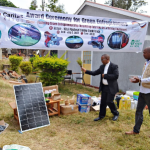Volkswagen’s shares declined on Wednesday following a profit warning triggered partly by the potential closure of an Audi plant and a 3.8% drop in second-quarter sales, primarily affected by China. Deliveries in China decreased by nearly 20%, reflecting a broader decline in sales of combustion engine cars, which still constitute the majority of Volkswagen’s offerings in the country.
As China moves rapidly towards an all-electric market, Volkswagen plans to increase its lineup of battery-powered vehicles in the coming years while prioritizing profitability, despite local competitors slashing prices by as much as 50%.
“We do not expect an easy year,” a spokesperson informed reporters.
The company revised its 2024 operating return on sales forecast downward to 6.5-7% from 7-7.5% and indicated that Audi is contemplating the closure of its Brussels site, affecting approximately 3,000 employees, due to weak demand for its higher-end electric cars.
As of 10:30 GMT, Volkswagen shares were down 1.13% at 105.4 euros, contributing to a year-to-date decline of 5.5%. Volkswagen projected that finding an alternative use for the Brussels plant or closing it, along with other associated costs, could amount to up to 2.6 billion euros ($2.8 billion) for the current financial year. The company has initiated a consultation process to explore alternative solutions for the site.
The future of Audi’s Brussels plant came under scrutiny earlier this year when Audi announced that the successor to the Q8 e-tron would be manufactured in Mexico. According to Audi, rising demand for newer models like the Q6 e-tron, set to debut this year, contributed to declining interest in the older Q8 e-tron produced in Brussels.
Audi has faced challenges in catching up with rivals BMW and Mercedes-Benz in the shift to electric vehicles. Stephen Reitman from Bernstein Research noted that earlier models like the first-generation Q8 e-tron were interim solutions, whereas Audi’s new premium electric platform, starting with the Q6, promises higher potential.
Looking ahead, Audi plans to refresh its lineup with over 20 new electric and combustion engine models by 2024 and 2025, transitioning to exclusively electric vehicles from 2026 onward.
Volkswagen, known for its strong union presence and not having closed a plant in four decades, faces pressure to reduce excess production capacity despite historically low margins in the first quarter. Analysts such as Daniel Schwarz from Stifel Research suggest that now is the time for Volkswagen to negotiate with unions.
Some analysts view the potential plant closure as a positive step toward addressing Volkswagen’s cost structure and excess capacity. Philippe Houchois of Jefferies highlighted that while concerns about headline figures may persist, Volkswagen is actively managing its costs, crucial for sustaining its business amid challenges in the automotive market.



